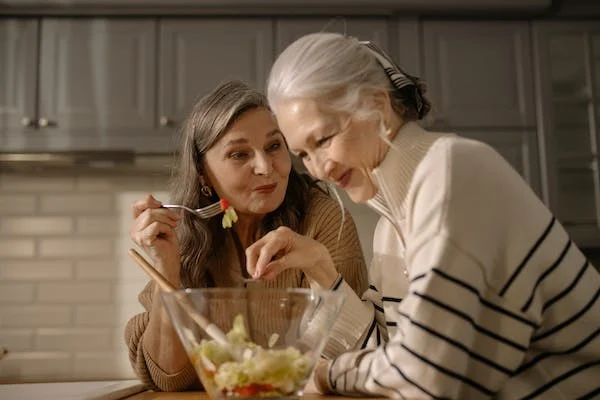Photo by Ravi Patel from Unsplash
The need to nourish our bodies with the right food becomes even more crucial as we age. Among others, such will be beneficial it comes to preserving our vision. The eyes, like any other part of our body, require essential nutrients to function properly. As such, it’s a must to plan a healthy diet for ensuring optimal vision through the years. Read on and learn about the best things to do.
Understanding Eye Health and Age-related Eye Diseases in the Elderly
Aging brings a plethora of changes in our lives. One that suffers over time is our vision. We become prone to different types of age-related diseases. Along with regular exercise, a healthy diet is key to preventing different eye conditions, including those we’ll discuss below.
Age-related Macular Degeneration
AMD affects the macula, the part of the eye responsible for sharp, central vision needed for activities like reading and driving. It’s characterized by blurriness or darkness in the center of the visual field.
Cataracts
Cataracts cloud the lens of the eye, leading to blurred or hazy vision. They develop slowly and can affect one or both eyes.
Glaucoma
It damages the optic nerve. The latter is known as the ‘cable’ that transmits visual information from the eye to the brain. Early stages often have no symptoms, but can eventually lead to vision loss if untreated.
Dry Eye Syndrome
Dry eye syndrome occurs when the eye doesn’t produce enough tears, causing symptoms such as discomfort, burning, or blurry vision.
Check out these resources to level up your knowledge on different eye conditions and how to promote healthier vision. Read articles from eye doctors and learn from their expert knowledge.
The Role of Nutrition in Eye Health
Nutrition plays a key role in maintaining and promoting eye health. The eyes rely on certain vitamins, minerals, and nutrients to function optimally. These nutrients aid in protecting the eyes from harmful light, repairing cellular damage, and maintaining eye structure.
Conversely, poor nutrition can speed up the process of age-related eye diseases. A diet lacking essential nutrients may not provide the necessary ‘tools’ to repair the damage, leaving the eyes vulnerable to conditions like cataracts and AMD.
Boosting eye health requires a conscious effort to incorporate key nutrients into our diet, including those mentioned below:
Vitamins A, C, and E
These potent antioxidants help protect the eyes from harmful free radicals. They also maintain the health of the retina and cornea. Foods rich in these vitamins include leafy green vegetables like spinach and kale, citrus fruits, carrots, and nuts like almonds and peanuts.
Zinc
Zinc aids in the production of melanin, a protective pigment in the eyes. Foods high in zinc include oysters, beef, and other kinds of seafood like crab and lobster.
Lutein and Zeaxanthin
These carotenoids, found in the macula, protect the eyes from harmful light. Good sources include green, leafy vegetables like kale and spinach. You’ll also find them in eggs, corn, and orange bell peppers.
Omega-3 Fatty Acids
Omega-3s are beneficial in preventing dry eyes. They’re found in fatty fish like salmon, sardines, and trout. Flaxseeds and walnuts also provide these beneficial fatty acids.
Healthy Eating Guidelines for the Elderly for Good Vision
Having learned about the necessary nutrients for good eye health, the challenge lies in effectively integrating these essential elements into our daily meals. Let’s explore some effective strategies:
Maintain a Balanced Diet
A balanced diet is the cornerstone of good health. Variety is essential. Eat different types of nutritious foods. Include a mix of fruits, vegetables, lean proteins, and whole grains in your diet. This diversity ensures a wide array of essential nutrients are covered.
For fruits and vegetables, try to create a ‘rainbow’ on your plate. The different colors often indicate the presence of various antioxidants. For instance, red tomatoes are rich in lycopene. Meanwhile, oranges are packed with vitamin C. On the other hand, green leafy vegetables are great sources of lutein. These are all antioxidants that contribute to good eye health.
Incorporate Nutrient-Dense Foods
While maintaining a balanced diet, emphasize foods that are rich in the essential eye health nutrients discussed earlier. A good way to start the day is with a spinach smoothie. This will give your body the needed dose of lutein and zeaxanthin. Enjoy citrus fruits, which pack Vitamin C. Flaxseeds are also great, which will provide Omega-3. Meanwhile, having salmon with quinoa and vegetables will also deliver dense nutrients.
Stay Hydrated
Hydration is crucial for all body tissues, including the eyes. Drinking plenty of water can prevent dry eyes and other health issues. Water is the best choice. Meanwhile, herbal teas and low-sodium broths will also help. Finally, fruits and vegetables high in water content, like cucumbers and watermelon are equally beneficial.
Mindful Eating
It’s not just about what we eat. The way we eat is equally important. Mindful eating involves eating slowly and savoring each bite. Doing so can help you avoid overeating and better appreciate the food you consume. This can also improve digestion. In turn, it is easier for your body to absorb all the essential nutrients.
Understanding Food Labels
Knowing how to read food labels can assist in making healthier choices. Eat foods high in the vitamins and minerals mentioned above. Also, avoid unhealthy fats and added sugars. Avoid processed foods that often contain high levels of sodium and sugar. Choosing whole foods, when possible, will provide the most nutrient-dense options for your meals.
Cooking Methods Matter
The way we cook our food can affect its nutritional value. Whenever possible, opt for cooking methods that preserve nutrients, such as steaming or grilling. Overcooking can reduce the nutrient content of food, especially water-soluble vitamins like vitamins C and B.
Conclusion

Photo by Matteo Vistocco from Unsplash
Maintaining eye health as we age requires a conscious effort, and proper nutrition is at the heart of it. Keeping in mind the things mentioned above will not only ensure the health of our eyes but also enhance our overall well-being. Let us remember, the journey to good eye health begins on our plate!











